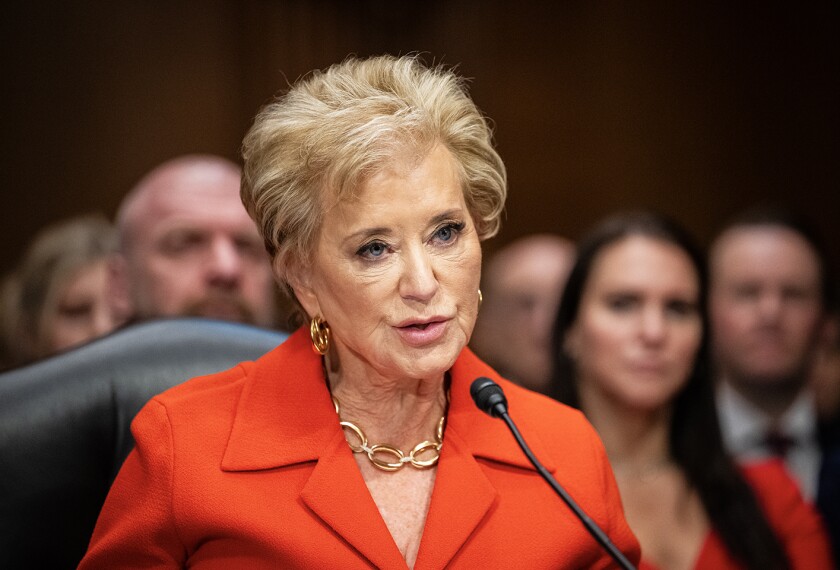Linda McMahon’s nomination to serve as secretary of education advanced through a U.S. Senate committee in a party-line vote on Thursday, paving the way for the business mogul to lead a diminished U.S. Department of Education and potentially seek its closure.
Senators on the Health, Education, Labor, and Pensions committee voted to approve McMahon’s nomination, , with all Democrats voting against her. Her nomination will now go to the full Senate for final approval.
“We need a strong leader at the department who will get our education system back on track, and Ms. McMahon is the right person for the job,” said Sen. Bill Cassidy, a Republican from Louisiana who chairs the committee. “Ms. McMahon demonstrated a strong vision for the Department of Education. She committed to empowering parents and returning powers to states and local communities, which, by the way, are best equipped to address students’ needs.”
Her nomination was contested by the nation’s largest teachers’ union, , saying the Trump administration’s “agenda is clear and dangerous.”
McMahon testified in front of senators last week, facing questions about the department’s already aggressive agenda in the wake of President Donald Trump’s return to the White House.
The department has already been significantly diminished, with more than 100 employees placed on administrative leave or terminated and scores of contracts canceled. Meanwhile, the agency has been amping up its enforcement of the president’s social agenda, rolling back protections for transgender students and seeking to weed out any use of diversity, equity, and inclusion in its practices and in schools.
The president had previously said he hoped McMahon would “put herself out of a job.” Before lawmakers, McMahon was adamant she would see that vision through—telling them education is “best handled at the state level,” though she agreed it would take congressional action to fully dismantle the agency.
Democrats worried, however, that the erosion of the Education Department would leave behind vulnerable students.
“It is the responsibility of the federal government to see that every kid in America, whether you’re poor, middle class, or rich, gets a quality education,” said Sen. Bernie Sanders, an independent from Vermont who caucuses with Democrats and is the committee’s ranking member for the minority party. “In my view, it really is … what the Department of Education does. Is it a perfect entity? No. Is it bureaucratic? Yes. Can we reform it? Yes. Should we abolish it? No.”
Sanders also doubted that McMahon would hold true power in a Trump administration in which the president and billionaire Elon Musk’s Department of Government Efficiency team have asserted more power.
Sen. Tim Kaine, D-Va., said he found areas of agreement with McMahon. But he said he couldn’t vote for someone “who will willfully engage in the destruction of the very agency she wants to lead.”
“That is disqualifying,” he said.
But Republicans dismissed those concerns, arguing it was time to reform the agency.
“God forbid that President Trump comes in and actually wants to make changes,” said Sen. Markwayne Mullin, R-Okla. “If we really say we’re for the kids, then let’s try something drastic. Let’s actually make a change.”
Though McMahon danced around specifics of how that might look like—other than her assurances that abolishing the department would not necessarily cut funding to programs supporting students from low-income families or students with disabilities—she floated ideas that appeared in the conservative public policy agenda Project 2025, penned by many who now work in Trump’s administration.
McMahon herself has a light resume in education. Though she once aspired to be a French teacher, she went on to found and oversee a multibillion-dollar wrestling entertainment organization. She served a short stint on Connecticut’s state school board, and as a long-time trustee of Sacred Heart University, a private religious school that bears her name on its student commons building.
McMahon would be joined in leadership at the department by two long-time state education chiefs, Penny Schwinn and Kirsten Baesler, whose nominations also require Senate confirmation.
McMahon will be no stranger to Capitol Hill. She served in Trump’s first administration, leading the U.S. Small Business Association. She has been chairwoman of the board for the America First Policy Institute, an organization formed after Trump’s 2020 election loss to propel his social agenda. She was also co-leader of Trump’s transition.






